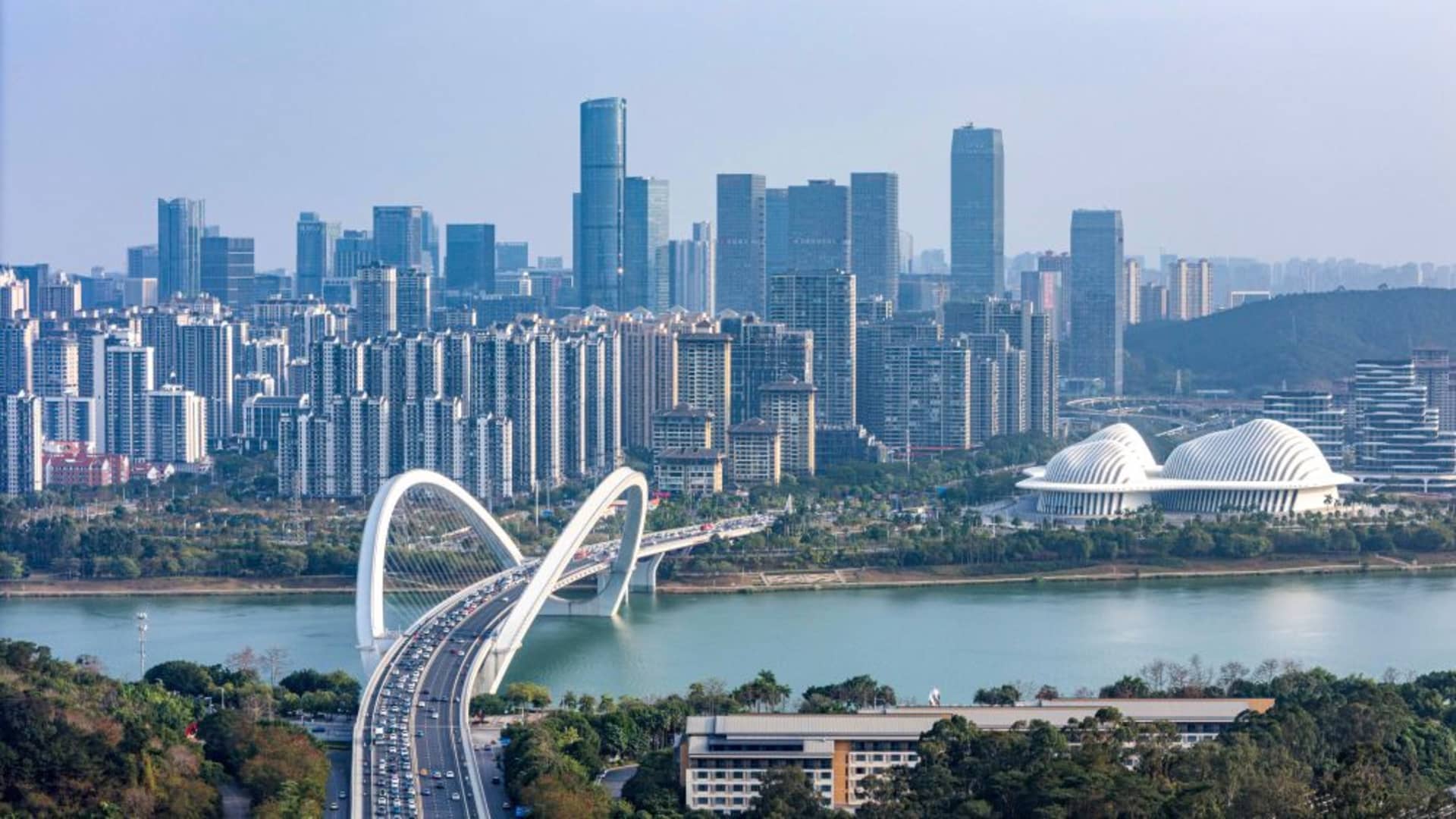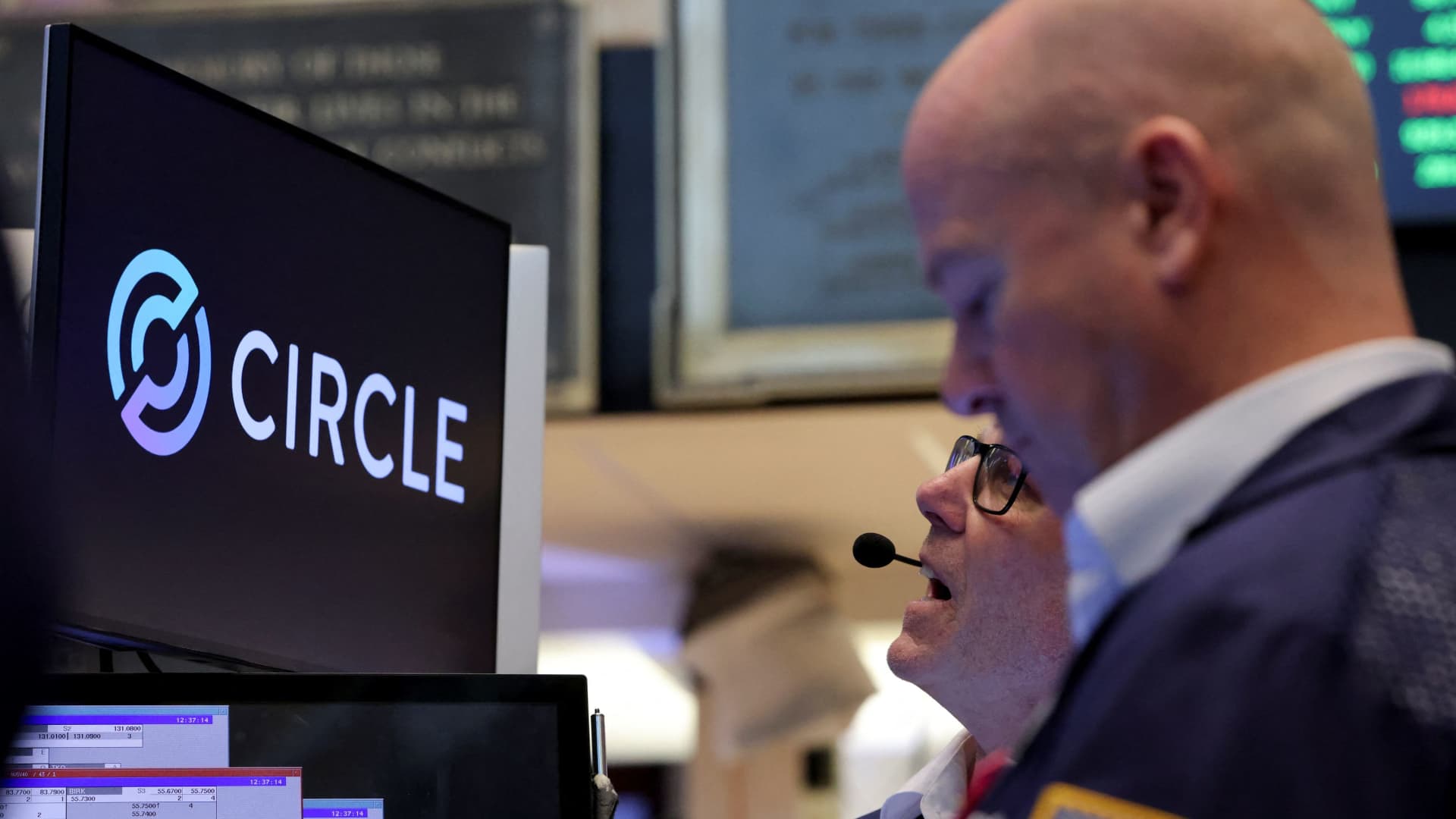An aerial view of a new city district in southern China’s Nanning city on Feb. 28, 2025.
Nurphoto | Nurphoto | Getty Images
China on Wednesday set its GDP growth target for 2025 at “around 5%” as it starts its annual parliamentary meeting amid escalating trade tensions with the U.S, according to a copy of the government work report seen by CNBC.
Beijing raised its budget deficit target to “around 4%” of GDP from 3% last year.
The 4% deficit would mark the highest on record going back to 2010, according to data accessed via Wind Information. The prior high was 3.6% in 2020, the data showed.
The government report laid out a plan to issue 1.3 trillion yuan ultra-long-term special treasury bonds in 2025, 300 billion yuan more than last year. Another 500 billion yuan worth of special treasury bonds will be issued to support large state-owned commercial banks.
The report reiterated Beijing’s plan to “adopt a more proactive fiscal policy.”
In an implicit acknowledgement of sluggish domestic demand, Beijing also revised down its annual consumer price inflation target to “around 2%” — the lowest in more than two decades — from 3% or higher in prior years, according to the Asia Society Policy Institute.
The new inflation goal would act more as a ceiling than a target to be realized. Consumer prices climbed just 0.2% in 2024 and 2023, while producer prices have declined for over two years.
The country’s annual parliamentary gathering, known as the “Two Sessions,” started Tuesday with the opening ceremony of the Chinese People’s Political Consultative Conference — a top advisory body.
The National People’s Congress kicked off its meeting Wednesday and is expected to wrap up its annual session on March 11. The foreign minister and heads of several economic departments are due to hold press conferences in the interim.
Tit-for-tat tariffs
This year’s parliamentary meetings come as Trump has imposed fresh tariffs on Chinese goods — an additional 20% in duties in just about a month.
Beijing on Tuesday responded with additional tariffs of up to 15% on some U.S. goods from March 10, and restrictions on exports to 15 U.S. companies. China also added 10 U.S. firms to an unreliable entities list that could limit their ability to do business in the Asian country. Many of the named U.S. businesses work in aerospace, defense or with drones.
“We hope to work with the U. S. side to address each other’s concerns through dialogue and consultation on the basis of mutual respect, equality, reciprocity, and mutual betterment,” Lou Qinjian, spokesperson for the third session of the 14th National People’s Congress, told reporters Tuesday morning.
“At the same time, we never accept any act of pressuring or threatening, and will firmly defend our sovereignty, security, and development interests,” he said in Mandarin, via an official translation.
Stimulus and tech
The increased U.S. duties will weigh on China’s exports, a rare bright spot in an economy struggling with lackluster domestic demand.
While the world’s second-largest economy grew by 5% in 2024, retail sales growth fell sharply to 3.4% from 7.1% in 2023. The real estate drag persisted, with investments in the sector dropping by 10.6% last year, from the a year earlier.
Investors have closely watched Beijing’s efforts to address the country’s economic slowdown after an unexpected, high-level pledge of support in September prompted a stock rally. Market gains picked up again after Chinese President Xi Jinping held a rare meeting last month with entrepreneurs including Alibaba’s Jack Ma and artificial intelligence startup DeepSeek’s Liang Wenfeng.
“There is no denying that AI technologies are accompanied by some unknown risks and challenges and will bring new tasks in areas like security, social governance, morality, and ethics. … It will inevitably have an impact on production,” Lou said.
“China … is opposed to over-stretching the concept of national security or politicizing economic and technological issues,” he said.
Investors will also be closely watching the parliamentary meetings for further comments on artificial intelligence and China’s efforts to provide regulatory certainty for the private sector.
— CNBC’s Bernice Ooi contributed to this report.

 Economics1 week ago
Economics1 week ago
 Economics1 week ago
Economics1 week ago
 Economics6 days ago
Economics6 days ago
 Finance1 week ago
Finance1 week ago
 Economics1 week ago
Economics1 week ago
 Blog Post6 days ago
Blog Post6 days ago
 Personal Finance6 days ago
Personal Finance6 days ago
 Finance6 days ago
Finance6 days ago










